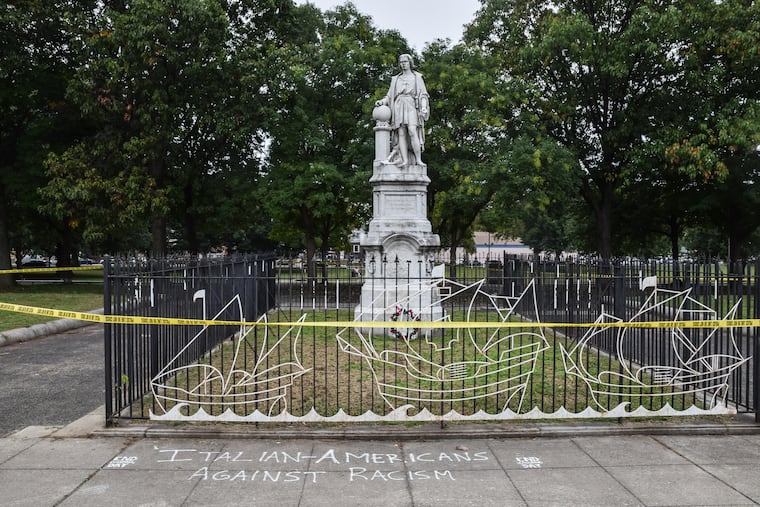Graffiti targeting Columbus Day found at two South Philly sites
For the first time in more than three decades, an Italian heritage group in South Philadelphia confronted ethnic vandalism.

On Columbus Day, standing in front of the History of Italian Immigration Museum he cofounded, Joseph Rollo read an inscription engraved on a sidewalk tile at his feet:
"Famiglia Grasso 1949
Famiglia Guzzardi 1947
From Italy & Carried
To America Dreams of
Hope & Created A Life
A Family, A Legacy"
"That's my parents," Rollo said.
And then he pointed just above the tiles, toward white graffiti spray-painted on the sidewalk at 1834 E. Passyunk Ave.: "COLUMBUS = MUSSOLINI = RIZZO = TRUMP = FASCIST." And, outside the front door, a message including the words racism, slavery, and genocide.
For the first time in more than 30 years, he said, the heritage group on Monday had to deal with ethnic vandalism.
"It's symptomatic of the times," Rollo said, "and the divisive nature of our country."
On Monday, when many government offices and several area school districts were closed for the federal holiday, taggers targeted the museum, along with a statue of Christopher Columbus in Marconi Park in South Philadelphia. The graffiti indicated that Columbus was viewed as a not particularly good guy.
Yellow police tape was placed around the Columbus monument at Broad Street and Oregon Avenue, where sidewalk graffiti read: "END COLUMBUS DAY" and "ITALIAN-AMERICANS AGAINST RACISM." The base of the statue had been tagged "GENOCIDE" and "STOLEN LAND."
According to Philadelphia police spokesperson Tanya Little, police discovered the museum graffiti at 9:06 a.m., and that on the the statue at 11:20 a.m. Surveillance footage was being reviewed, but police said they had no suspects as of 5 p.m.
A Columbus monument at Penn's Landing was not vandalized, and a wreath was at its base Monday.
In 1987, Rollo, a lawyer, cofounded the Philadelphia chapter of Filitalia International with Pasquale Nestico, a cardiologist, as a refuge for immigrants. In 2014, they opened the History of Italian Immigration Museum at their South Philadelphia location to help preserve the Italian language and culture in America.
"And it was an attempt to coordinate efforts of Italian Americans, and a point of reference and to act together in this society," Rollo said.
Filitalia means "Love for Italy."
When the museum opened, members donated to memorialize relatives on the sidewalk tiles. In 2018, Rollo said, it's a different world.
"Everybody wants a forum," Rollo said, "and sometimes they mistake Facebook-type posts for acts of civic importance."